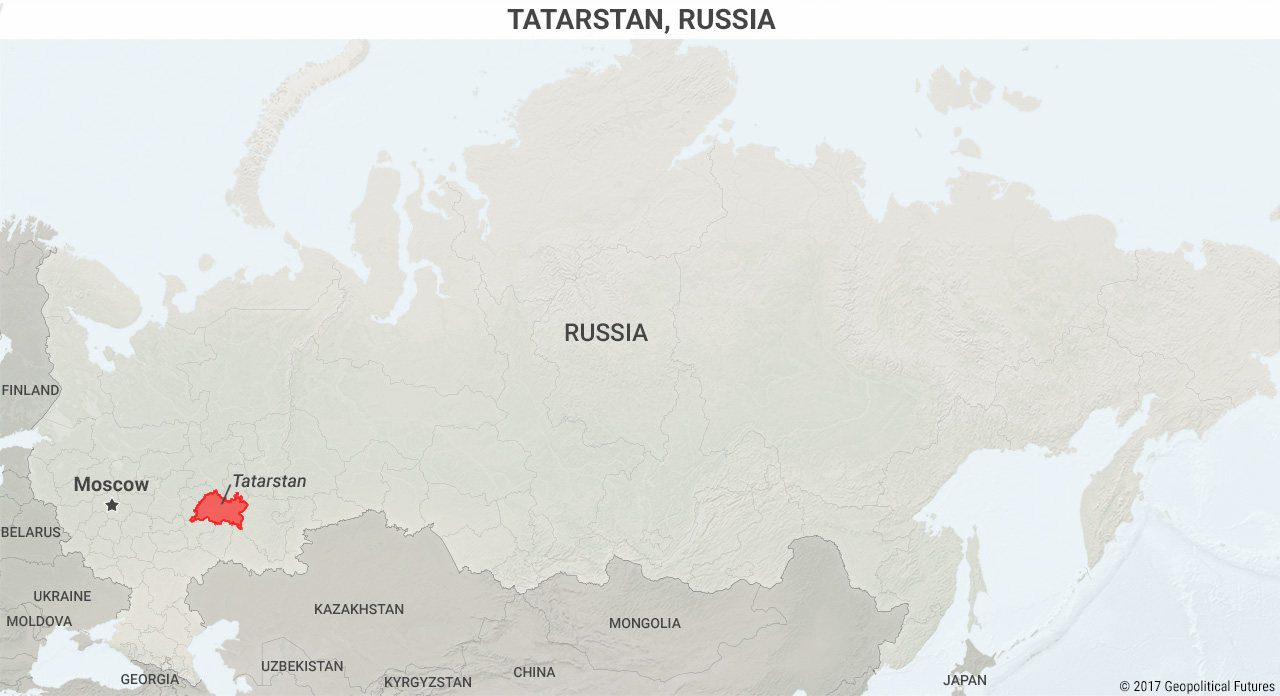By Xander Snyder
Tatarstan, one of the few remaining semi-autonomous regions in Russia, has come up against a deadline that threatens what independence it has left. On July 24, the treaty that defined its relationship with Russia was set to expire. Failing to replace or extend the treaty would be risky for both sides, though Russia may find ways to capitalize on it as well.
Resilience
Semi-autonomous republics have come and gone in Russia, but Tatarstan is arguably the most resilient. Local nationalists have likely existed ever since Russia took control in 1552, and they attained a degree of autonomy in 1920, when the Soviet Union declared Tatarstan an Autonomous Soviet Socialist Republic. Even today, it is the last republic that still has a president.
Its resilience also stems from a relatively diversified economy. It boasts a healthy mineral extraction sector with decent contributions from construction and manufacturing. It is also currently one of the few Russian territories that pays more taxes than it collects in central government subsidies.
Tatarstan’s economy has, at times, given it some leverage over Moscow. It declared its independence as the Soviet Union collapsed in 1991, and it abstained from Russian unification talks in 1992. It was able to do so because the government in Moscow was in disarray, and the fact that it produced roughly 20 percent of Russian oil at the time probably didn’t hurt. And so, two years later, Tatarstan signed an agreement that gave it semi-autonomous status, with provisions for creating its own laws, levying its own taxes and having its own citizenship. The agreement wasn’t ideal for Tatarstan – it originally wanted an “associated” status instead of the lesser “united” status that it obtained. The treaty was modified slightly in 2007 – it clarified the status of the republic and required its president to speak two languages – but for the most part stayed true to the 1994 treaty. It’s this newer incarnation that was set to expire July 24.
Under Vladimir Putin, who came to power in 2000, the Russian government has tried to bring its semi-autonomous republics to heel. Central to its efforts is the collection of more taxes – a move Tatarstan has strongly opposed. (Such taxes are all the more important to Moscow in light of low oil prices.) The republic, led by President Rustam Minnikhanov, can afford to oppose the move in part because of its economic leverage.
But Tatarstan has lost some of that leverage. After a recent banking crisis, for example, the republic was forced to appeal to Russia’s Deposit Insurance Agency, the federal entity responsible for insuring banking deposits, to bail out the depositors of a Tatarstan bank called Tatfondbank. This served a dual purpose for Moscow: to gain support among Tatarstan citizens and to penalize business elites who had rallied behind Minnikhanov. Other banks in Russia have had their charters revoked, but few have seen senior bank managers indicted with criminal charges, as was the case for Tatfondbank.
Treading Lightly
The Tatfondbank episode shows that while Tatarstan may have a strong economy, it cannot survive on its own. It is surrounded by Russian territory and uses Russian infrastructure, so its mineral fuel, not to mention its other economic activities, would be severely constrained if Russia decided to shut down the area or isolate the region.
Even the treaty itself has become a tool of retribution. Tatarstan had originally sought a simple extension of the existing treaty, but about two weeks ago sent the draft of a new proposal to Moscow. Moscow has not simply forgotten about the expiration date: that it has passed and a new agreement has not been announced is a sign that Moscow is choosing to exert pressure on Tatarstan for its prior opposition to Moscow’s policies. Letting the treaty expire gives Moscow something to use against Tatarstan as it continues to rein in its semi-autonomous republics and subject them to a set of uniform laws. This could include revoking its right to pass legislation and disallowing it to manage its own taxes, police force, judicial system and aspects of its foreign relations.
Even if a new treaty is ultimately signed, letting the existing treaty expire serves Russia’s purpose because it undermines Minnikhanov, one of Moscow’s more vocal opponents. His failure to acquire an extension of the treaty would represent such a significant political loss for him that he would be hard-pressed to rally the anti-Kremlin support that, to date, he has been able to rally.
Hurting Minnikhanov’s credibility would not, however, solve the problems that pit Tatarstan and Russia against each other. If the two sides do not come up with a proposal to replace the treaty, a constitutional referendum may need to be held to repeal the section of the Tatarstan constitution that stipulates how Tatarstan’s relations with Moscow are governed. This would create a showdown between Moscow and Tatarstan that Moscow would like to avoid, since it would require Moscow declaring the referendum illegitimate and then backing up that claim by punishing Tatarstan economically or militarily. Some sort of compromise is therefore likely, but only after Moscow punishes Minnikhanov for his opposition and gains concessions under a different arrangement.
But Moscow may need to tread lightly. Tatarstan is majority Muslim, and though religious radicalism is not historically a risk in Tatarstan like it is in the North Caucasus, in recent years ultraconservative Salafists have begun to appear in the republic, reportedly at the behest of Saudi Arabia. If this is true, it’s possible that faith-based separatism from the North Caucasus could spread to Tatarstan. Moscow can’t even allow secular separatist movements to spread in its republics; they can be overtaken by more radical elements, as was the case in Chechnya in the 1990s.
GPF has forecast that Moscow will lose some control over its territory, creating decentralized power structures throughout the country. But before this happens, we expect the government to make a stronger push to exert control. What’s happening in Tatarstan aligns with that forecast. However, no amount of politicking will eliminate Tatarstan nationalism, which is influenced by a long history of exerting greater influence in the region. Additional taxes imposed on Tatarstan by Moscow would only make things worse, and control over the region will erode as Moscow’s resources – which are increasingly stressed by falling federal government revenues from low energy prices – dwindle.
For now, Moscow has the upper hand over the negotiations. Tatarstan would like greater sovereignty but there is only so much it can do, surrounded as it is by Russian territory. Russia’s financial woes, however, will make Tatarstan increasingly difficult to hold on to.








 The Geopolitics of the American President
The Geopolitics of the American President